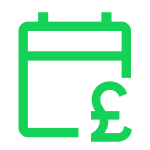What is persistent debt?
Persistent debt means that for 18 months or longer you’ve been paying more in interest, fees and charges than you have paying off the amount borrowed on your credit card. This is an expensive way to borrow money and means it could take you longer to pay off your credit card.
If we think you’re in persistent debt, we’ll contact you to offer help on how you can manage your repayments to get out of persistent debt faster.
Steps you can take to reduce your debt
There are some things you can do right away that could help reduce your debt.
Use any savings
If you're keeping any savings tucked away, it's better to use them to pay off your credit balance sooner rather than later. Your savings will be earning less interest than you're paying on your debt. By using them to pay some or all of it off, you'll pay less interest in the long run.
Make bigger repayments
If you can afford it, paying off more than the minimum will reduce your overall debt quicker and the amount of interest you pay in the long run. If you can pay a fixed amount each month that's more than the minimum repayment, you'll put yourself on the road to exiting persistent debt.
Make extra payments
If you find yourself with a few extra pounds each month, you can always make an extra payment to your credit card on top of your regular monthly payment.
Consider other types of credit
Different kinds of credit work better for different needs. For example, flexible short term credit such as overdrafts and credit cards have higher interest rates than long term credit like a personal loan.
By looking at the kind of debt you have, you may be able to get lower interest rates than you’re currently on, which could save you money in the long run.
Help and support is available
If you’re struggling to manage your finances, we’re here to help. We encourage you to call our Credit Management Team directly to discuss the ways we can help you manage your repayments and reduce your debt.
You can call us on 0203 059 5784 Monday to Thursday from 8am to 8pm, Friday 8am to 6pm and Saturday 9am to 1pm.
You can also get helpful advice by speaking to an independent organisation. Here are some free and confidential services available to help you:
Useful tools to take control of your finances

MoneyHelper's budget planner
MoneyHelper’s budget planner helps you know exactly how much money you’re spending and have coming in. Managing your budget this way can help put you in control of your finances and stay on track with paying off any debt.

MoneyHelper's credit card calculator
MoneyHelper’s credit card calculator shows you how much a credit card will cost you. It also shows how by increasing your monthly repayments, you can pay off your existing cards faster and save on interest.

MoneyHelper's bill prioritiser
Unsure which bills to pay first? The consequences of missing some bills can be worse than others, so it’s important to pay them in the right order. MoneyHelper’s bill prioritiser can help.
Terms and Conditions apply, including applicants being resident in the UK & aged 18+ and, if relevant, businesses being based in the UK.
For full website terms including information on Cashplus Bank, Mastercard and use of Trademarks, please see our full legal disclosures at https://www.cashplus.com/legal/.
Advanced Payment Solutions Limited (APS), trading as Cashplus Bank, is registered in England and Wales at Cottons Centre, Cottons Lane, London SE1 2QG (No.04947027). APS is authorised by the Prudential Regulation Authority and regulated by the Financial Conduct Authority and the Prudential Regulation Authority under Firm Reference Number 671140.
APS provides credit facilities subject to approval and affordability, and where accounts continue to meet APS credit criteria.


